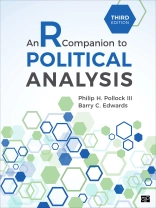The Third Edition of An R Companion to Political Analysis by Philip H. Pollock III and Barry C. Edwards teaches your students to conduct political research with R, the open-source programming language and software environment for statistical computing and graphics. This workbook offers the same easy-to-use and effective style as the other software companions to the Essentials of Political Analysis, tailored for R. With this comprehensive workbook, students analyze research-quality data to learn descriptive statistics, data transformations, bivariate analysis (such as cross-tabulations and mean comparisons), controlled comparisons, correlation and bivariate regression, interaction effects, and logistic regression. The clear explanations and instructions are aided by the use of many annotated and labeled screen shots, as well as QR codes linking to demonstration videos. The many end-of-chapter exercises allow students to apply their new skills.
The Third Edition includes new and revised exercises, along with new and updated datasets from the 2020 American National Election Study, an experiment dataset, and two aggregate datasets, one on 50 U.S. states and one based on countries of the world. A new structure helps break up individual elements of political analysis for deeper explanation while an updated suite of R functions makes using R even easier. Students will gain valuable skills learning to analyze political data in R.
Innehållsförteckning
Chapter 1: Using R for Data Analysis
Chapter 2: Descriptive Statistics
Chapter 3: Creating and Transforming Variables
Chapter 4: Making Comparisons
Chapter 5: Graphing Relationships and Describing Patterns
Chapter 6: Random Assignment and Sampling
Chapter 7: Making Controlled Comparisons
Chapter 8: Foundations of Statistical Inference
Chapter 9: Hypothesis Tests with One or Two Samples
Chapter 10: Chi-Square Test and Analysis of Variance
Chapter 11: Correlation and Bivariate Regression
Chapter 12: Multiple Regression
Chapter 13: Analyzing Regression Residuals
Chapter 14: Logistic Regression
Chapter 15: Doing Your Own Political Analysis
Om författaren
Barry C. Edwards writes textbooks and works for Fair Trial Analysis, LLC, a company that conducts research on juries and jurors for civil and criminal litigation. He received his B.A. from Stanford University, a J.D. from New York University, and a Ph.D. from the University of Georgia. He taught survey design and analysis, research methods, and prelaw courses at the University of Central Florida and continues to teach occasional courses for the University of Georgia. His political science interests include American politics, public law, and research methods. He founded the Political Science Data Group and created the Poli Sci Data.com website. His research has been published in American Politics Research, Congress & the Presidency, Election Law Journal, Emory Law Journal, Georgia Bar Journal, Harvard Negotiation Law Review, Journal of Politics, NYU Journal of Legislation and Public Policy, Political Research Quarterly, Presidential Studies Quarterly, Public Management Review, State Politics and Policy Quarterly, and UCLA Criminal Justice Law Review.












